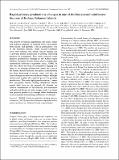Files in this item
Rapid primary productivity changes in one of the last coastal rainforests : the case of Kahua, Solomon Islands
Item metadata
| dc.contributor.author | Garonna, Irene | |
| dc.contributor.author | Fazey, Ioan Raymond Albert | |
| dc.contributor.author | Brown, Molly E. | |
| dc.contributor.author | Pettorelli, Nathalie | |
| dc.date.accessioned | 2010-12-06T20:14:02Z | |
| dc.date.available | 2010-12-06T20:14:02Z | |
| dc.date.issued | 2009-09 | |
| dc.identifier | 4708368 | |
| dc.identifier | 95f369a9-4689-4669-bfaa-27cbc466ae7e | |
| dc.identifier | 000275897300010 | |
| dc.identifier | 77951207737 | |
| dc.identifier.citation | Garonna , I , Fazey , I R A , Brown , M E & Pettorelli , N 2009 , ' Rapid primary productivity changes in one of the last coastal rainforests : the case of Kahua, Solomon Islands ' , Environmental Conservation , vol. 36 , no. 3 , pp. 253-260 . https://doi.org/10.1017/S0376892909990208 | en |
| dc.identifier.issn | 0376-8929 | |
| dc.identifier.uri | https://hdl.handle.net/10023/1628 | |
| dc.description.abstract | The growth of human populations has many direct and indirect impacts on tropical forest ecosystems both locally and globally. This is particularly true in the Solon-ion Islands, where coastal rainforest cover still remains, but where climate change and a growing human Population is putting increasing pressure on ecosystems. This study assessed recent primary productivity changes in the Kahua region (Makira, Solomon Islands) using remote sensing data (normalized difference vegetation index, NDVI). In this area, there has been no commercial logging and there is no existing information about the state of the forests. Results indicate that primary productivity has been decreasing in recent years, and that the recent changes arc more marked near vi I]ages. Multiple factors may explain the reported pattern in primary productivity. The study highlights the need to (1) assess how accurately remote sensing data-based results match field data on the ground; (2) identify, the relative contribution of the climatic, socioeconomic and political drivers of such changes; and (3) evaluate how primary productivity changes affect biodiversity level, ecosystem functioning and human livelihoods. | |
| dc.format.extent | 8 | |
| dc.format.extent | 309566 | |
| dc.language.iso | eng | |
| dc.relation.ispartof | Environmental Conservation | en |
| dc.subject | MODIS (moderate-resolution imaging spectro-radiometer) | en |
| dc.subject | NDVI (normalized difference vegetation index) | en |
| dc.subject | primary productivity | en |
| dc.subject | Solomon Islands | en |
| dc.subject | Tropical forests | en |
| dc.subject | AVHRR DATA | en |
| dc.subject | Satellite data | en |
| dc.subject | South America | en |
| dc.subject | Vegetation | en |
| dc.subject | Climate | en |
| dc.subject | Environment | en |
| dc.subject | Adaptation | en |
| dc.subject | Cover | en |
| dc.subject | NDVI | en |
| dc.subject | QH Natural history | en |
| dc.subject | SDG 13 - Climate Action | en |
| dc.subject.lcc | QH | en |
| dc.title | Rapid primary productivity changes in one of the last coastal rainforests : the case of Kahua, Solomon Islands | en |
| dc.type | Journal article | en |
| dc.contributor.institution | University of St Andrews. Scottish Oceans Institute | en |
| dc.contributor.institution | University of St Andrews. Geography & Sustainable Development | en |
| dc.contributor.institution | University of St Andrews. School of Geography and Geosciences | en |
| dc.identifier.doi | https://doi.org/10.1017/S0376892909990208 | |
| dc.description.status | Peer reviewed | en |
This item appears in the following Collection(s)
Items in the St Andrews Research Repository are protected by copyright, with all rights reserved, unless otherwise indicated.

